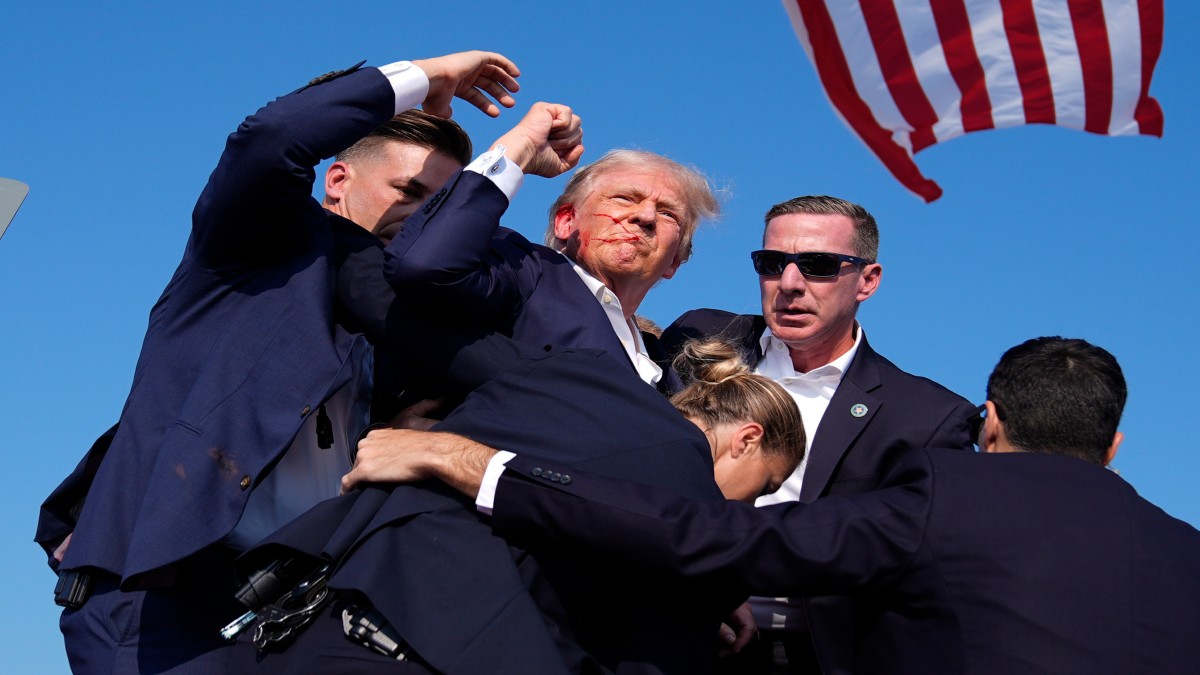Running for the US president for the third time as a Republican candidate, Donald Trump survived an assassination attempt on Saturday at a campaign rally in Pennsylvania. Trump was hurried off stage after gunshots echoed through the venue. Before being ushered away by his security detail, Trump, with blood trickling from a wound on his ear, raised his fist defiantly toward the crowd. The fist has become a symbol of Trump’s resolve for his supporters to win the November election.
While Trump is safe and there is no danger to his life from the injury that he suffered on Saturday, the impact of this incident on his campaign is uncertain. Global historical precedents suggest that his popularity might receive a significant boost. Assassination attempts targeting populist leaders have often led to a surge in public support, transforming them into symbols of resilience and defiance.
What’s the response in the US?
Saturday’s shooting at US former President Donald Trump’s election rally raises his odds of winning back the White House, and trades betting on his victory will increase this coming week, Reuters quoted investors as saying.
Soon after the shooting, billionaire hedge fund manager Bill Ackman endorsed Trump. Similarly billionaire Elon Musk endorsed Trump, calling him “tough” on his social media platform X.
“The election is likely to be a landslide. This probably reduces uncertainty,” Reuters quoted Nick Ferres, chief investment officer at Vantage Point Asset Management, as saying. Ferres cited a similar surge in support for Ronald Reagan after a 1981 assassination attempt.
Impact Shorts
More ShortsClues from around the world
Globally, history provides several instances where leaders have seen a rise in popularity following assassination attempts. Former Pakistani Prime Minister Imran Khan witnessed a surge in support after he was shot in the leg at a political rally. The public began to view him as a lone warrior battling against a corrupt establishment. He campaigned to give Pakistani people a new hope to revive the fortunes of the country.
Similarly, Brazilian leader Jair Bolsonaro was stabbed during an event in 2018. The attack bolstered his image among voters, leading to a significant victory in the subsequent election. Bolsonaro’s supporters perceived him as a survivor of an assassination attempt by ideological adversaries.
In India, the Indian National Congress (INC) won the country’s biggest electoral mandate in the 1984 national polls, held under the shadow of the assassination of Indira Gandhi, who had been shot multiple times by two of her bodyguards. More than six years later, her son Rajiv Gandhi was assassinated during the election campaign in 1991 which saw a struggling Congress win back power though without securing a majority of its own the Lower House of Parliament.
The US’s own historical tune
In the United States, President Ronald Reagan is said to have benefited from public sympathy following an assassination attempt in 1981 — just two months into his first presidency. This surge in support enabled him to push through a series of controversial economic policies that would shape the country’s future for decades. Many analysts believed that this assassination bid helped him win the second consecutive presidency in the 1984 election.
While these examples suggest that assassination attempts can boost a leader’s popularity, the United States offers a more nuanced history in this regard. In 1912, former President Theodore Roosevelt, campaigning for a second non-consecutive term as the Bull Moose candidate, survived an assassination attempt in Milwaukee. John Schrank, a New York saloon-keeper, shot Roosevelt, but the bullet’s impact was mitigated by a thick copy of his speech and a metal eyeglass case in his breast pocket.
Despite being wounded, Roosevelt displayed remarkable defiance — much more than Trump — insisting on delivering his speech and waving off pleas to seek immediate medical attention.
“I don’t know whether you fully understand that I have just been shot,” he told the audience, “but it takes more than that to kill a Bull Moose.” While Roosevelt garnered immense sympathy and respect for his courage, he lost the election.
Gerald Ford, a Republican leader, also failed to secure a second consecutive term after surviving an assassination attempt in 1975. The 1976 election saw him lose to Democrat Jimmy Carter, who had fought a tough battle both within his party and in the general election.
The road ahead for Trump
The impact of Saturday’s shooting on Donald Trump’s campaign remains to be seen. History suggests that such incidents can evoke public sympathy and bolster a leader’s image as a resilient figure. However, the ultimate effect on the election will depend on various factors, including how the incident is perceived by the electorate and how Trump’s campaign leverages the event.
As the United States approaches the election, the narrative surrounding Trump’s defiance in the face of danger could play a crucial role in shaping voter sentiment. Whether this incident will secure him a path back to the White House or simply add another dramatic chapter to his chequered political career is a question that only time will answer.
)